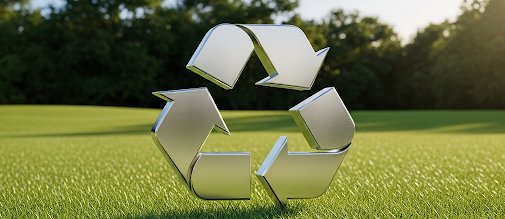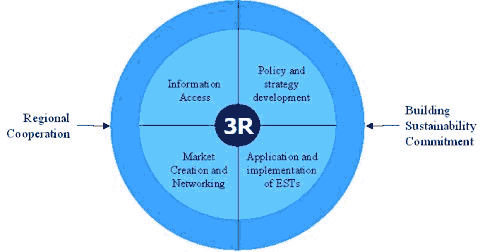Components of a Sound 3R Policy
|

Abstract
A comprehensive and effective 3R (Reduce, Reuse, Recycle) policy framework requires attention to four key components: policy and strategy development, information access, market creation and networking, and the implementation of environmentally sound technologies (ESTs).
These are underpinned by two cross-cutting issues: fostering long-term sustainability commitment and encouraging regional cooperation. Together, these components support local and national governments in designing and operationalizing effective 3R strategies that align with broader development goals such as economic growth, environmental protection, and social well-being.
Keywords
3R policy, sustainability, regional cooperation, ESTs, information access, market creation, waste management, environmental strategy
|
 |
Hari Srinivas |
|
Policy Analysis Series E-095. April 2015.
|
For a local or national government to adopt a sound 3R policy, there are essentially four key components that need to be considered. These are: (1) policy and strategy development, (2) information access, (3) market creation and networking, and (4) application and implementation of ESTs. There are also two cross-cutting issues that have to be taken into consideration: (1) building sustainability commitment, and (2) regional cooperation. These are explained below:
Key Components:
- Policy and strategy development: Activities under this component will focus on the development of focused environmental laws and regulations, and capacity building for their implementation and enforcement. It will also look into standards and codes, and the provision of financial incentives and subsidies for 3R policy implementation. The use of existing strategies such as EMS, cleaner production etc. for the promotion of 3Rs will also be explored. Success in this component will depend on the policies' effective integration into larger developmental priorities such as job creation, income generation and poverty alleviation.
- Information access: Activities under this component will focus on the provision of reliable and credible information for awareness raising of critical stakeholders. Workshops and training sessions will build on decision-making tools and strategies on such issues as risk assessment, cost-benefit analyses etc. An online and/or offline technology marketplace can be developed to speed up the adoption of technologies that facilitate 3Rs and are environmentally sound. Environmental education for the public is also a critical issue for this component.
- Market creation and networking: Activities under this component will focus on market trend analyses, and look into creation of a business model for 3R promotion and implementation. It will look into the creation of complementary and supportive technology and industry clusters that can generate closed loops for 3Rs and material flows. Creating a market for products and services that promote 3Rs is critical, and hence these components will look at the entire lifecycle of a product, including post-consumer stages, and ensure that all aspects are considered - as espoused by the concept of 'extended producer responsibility'. This can be facilitated by interaction with consumer groups and end-users, as well as intermediate suppliers and traders. Producers in steel, pulp, cement and other such key industries can also be among the target groups.
- Application and implementation of environmentally sound technologies (ESTs): Activities under this component will focus on improving the access to innovative and appropriate technologies that are environmentally sound. Implementing good demonstration projects along with technical assistance, will be critical in highlighting the viability of 3R policies. The context in which 3Rs will be implemented and used - in eco-towns and eco-industrial estates - will also form an important part of this component. Capacity building and training of the appropriate stakeholders will have to be carried out, along with provision of financial resources.

Cross-cutting issues:
- Building sustainability commitment: Activities under this component will promote the shift from economic growth and development to sustainable development, taking into account the sustainability trends world wide, and global initiatives being undertaken (for example, the Global Compact, Triple Bottom Line, Sustainability Reporting Initiative, Corporate Social Responsibility, Global Reporting Initiative etc.) by different entities in the public and private sector.
- Regional cooperation: Activities under this component will focus on the creation of networks for effective cooperation. A portfolio of policies and strategies will have to be developed, covering issues such as terminology, procedures, guiding principles, indicators etc. Regional databases of information on different aspects such as technologies and information (Technologies here not only cover individual technologies, but entire systems facilitating management, maintenance, use and disposal of such technologies and the materials/wastes that they generate.)
Table 1: Three Examples from Japan
|
Eco-Town Initiative in Kawasaki
Kawasaki City has established itself as a leading example of implementing environmentally sound technologies (ESTs) through its Eco-Town program. Originally an industrial hub, Kawasaki transformed its economic base by integrating recycling businesses with research and development centers. Projects within the Eco-Town include industrial symbiosis models where by-products from one factory become raw materials for another, especially in steel, cement, and chemical industries. This approach has significantly reduced industrial waste and greenhouse gas emissions, showcasing the practical application of 3R principles within a regional development framework.
|
Tokyo's Green Procurement Policy
Tokyo Metropolitan Government has developed a strong policy and strategy framework for green procurement, focusing on products with recycled content and lower environmental impact. This policy not only drives market creation for 3R-compliant goods but also encourages manufacturers to adopt extended producer responsibility. Financial incentives and compliance monitoring are embedded in the system to ensure widespread adoption among suppliers and contractors.
|
Kansai Region's 3R Network
In the Kansai region, a multi-stakeholder platform involving local governments, industries, and academic institutions facilitates regional cooperation for 3R promotion. This network enhances access to information through shared databases on recycling technologies and best practices, and organizes training workshops and seminars to build capacity among smaller municipalities. By fostering horizontal learning and pooling resources, Kansaifs initiative highlights the importance of regional integration in scaling up 3R efforts.
|
|


